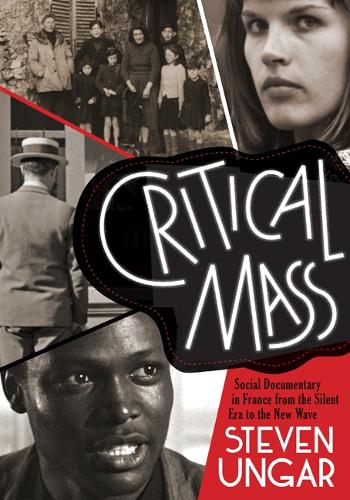
Critical Mass: Social Documentary in France from the Silent Era to the New Wave
(Paperback)
Publishing Details
Critical Mass: Social Documentary in France from the Silent Era to the New Wave
By (Author) Steven Ungar
University of Minnesota Press
University of Minnesota Press
1st December 2018
United States
Classifications
Professional and Scholarly
Non Fiction
Documentary films
070.18
Physical Properties
Paperback
344
Width 178mm, Height 254mm, Spine 38mm
Description
Thirty-five years of nonfiction films offer a unique lens on twentieth-century French social issues.
Critical Mass is the first sustained study to trace the origins of social documentary filmmaking in France back to the late 1920s. Steven Ungar argues that socially engaged nonfiction cinema produced in France between 1945 and 1963 can be seen as a delayed response to what filmmaker Jean Vigo referred to in 1930 as a social cinema whose documented point of view would open the eyes of spectators to provocative subjects of the moment.
Ungar identifies Vigo's manifesto, his 1930 short propos de Nice, and late silent-era films by Georges Lacombe, Boris Kaufman, AndrSauvage, and Marcel Carn as antecedents of postwar documentaries by Eli Lotar, Ren Vautier, Alain Resnais, Chris Marker, and Jean Rouch, associated with critiques of colonialism and modernization in Fourth and early Fifth Republic France.
Close readings of individual films alternate with transitions to address transnational practices as well as state- and industry-wide reforms between 1935 and 1960.
Critical Mass is an indispensable complement to studies of nonfiction film in France, from Georges Lacombe's La Zone (1928) to Chris Marker's Le Joli Mai (1963).
Reviews
"Brimming with as many fruitful insights as remarkable discoveries, Critical Mass amounts to a Declaration of Social Purpose for early French documentary film. Steven Ungar yokes the daring-do of the avant-garde to the political goals of the left over the course of some forty years of filmmaking. It is a triumph of critical analysis."Bill Nichols, author of Introduction to Documentary, Third Edition
"A powerhouse crowning the career of a distinguished scholar of twentieth-century studies, Critical Mass will be an enduring point of reference for the history of both documentary cinema in France and of the genre tout court. Wide-ranging, meticulously researched, and incisive, Steven Ungars readings recover the contexts that shape documentary style, form, and process. Had Andr Breton read Critical Mass, he would have concluded, rightly, that cinema will be documentary or it will not be."Tom Conley, Harvard University
Author Bio
Steven Ungar is professor of cinema, French, and comparative literature at the University of Iowa. He is author of Roland Barthes: The Professor of Desire; Scandal and Aftereffect: Blanchot and France since 1930 (Minnesota, 1995); Clo de 5 7; and coauthor of Popular Front Paris and the Poetics of Culture.
